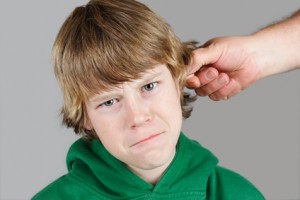Think Like a Child to Discipline Well
Learning how children think helps parents discipline well. It’s true. Knowing how children process information gives parents crucial information for effectively stopping unwanted behavior and teaching desired behavior. Take lying for example. Studies suggest that up to 96% of children lie (see Help! My Teen Lies to Me for information on teens lying). So, if you have children you will have to deal with children lying. But, consider how children’s reasons for lying changes as they mature.
 Three-year-olds lie to avoid punishment. Even if you catch them with their hand in the proverbial cookie jar, in the act itself, they will lie in an attempt to avoid punishment. When researchers asked five-year-olds about lying, 92% said lying was “always wrong.” Still, they lied. Why? To avoid getting punished.
Three-year-olds lie to avoid punishment. Even if you catch them with their hand in the proverbial cookie jar, in the act itself, they will lie in an attempt to avoid punishment. When researchers asked five-year-olds about lying, 92% said lying was “always wrong.” Still, they lied. Why? To avoid getting punished.- Things seem to change around six-years-old. Six-year-olds no longer lie when caught with their hand in the cookie jar. Instead, they tell the truth hoping it will make their parent happy (and it usually does). They no longer lie to simply avoid punishment but to keep their parents happy as well. They want the reward of parents who are happy with them.
- When children hit the “preteen” years, they demonstrate an awareness of the impact of lying on others. They become more considerate of other people’s feelings and the potential risk lying poses to relationships. About 22% of eleven-year-olds carry some guilt for lying. They want to part of a group and know that lying can isolate them from the group.
- 48% of eleven-year-olds say that lying destroys trust. They know that lying breaks down the social order. If a person lies, who can you trust…and how can society operate without trust.
I share these findings to make a point. Children think differently at different ages. To discipline effectively, a parent needs to consider their children’s developmental level and address the behavior at that level. In other words, they need to think like their children. A three-year-old may respond to a simple time out in a chair while a six-year-old will need more…like the constant acknowledgement of positive behaviors. Six-year-olds love to help their parents, providing an excellent opportunity to teach them chores and responsibilities. Eleven-year-olds begin to understand how behaviors impact their relationships and the world around them. Our explanations for appropriate behavior need to include this information. (More on child development in 5 Steps of Moral Development)
You get the idea. Listen to your children. Listen to how they think and observe what they find important. Learn about the changes that occur in children as they mature (More on development at Ages & Stages from Healthy Children). Use all this information in creative ways to discipline your children…and enjoy the rewards of your effective discipline!
-0 Comment-